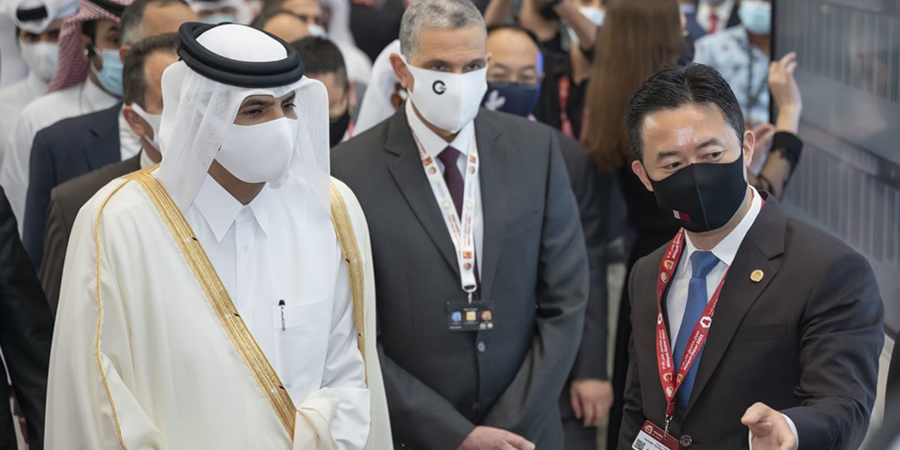President of Huawei Middle East Charles Yang highlights the company’s efforts to support governments and enterprises in the Middle East region, particularly Qatar, in the recently concluded Milipol Qatar 2021 event. Yang reaffirmed that by building stronger ICT ecosystems and cybersecurity-focused programs, Huawei can contribute to achieving national development visions.
His Excellency Sheikh Khalid bin Khalifa bin Abdulaziz Al Thani, Qatari Prime Minister and Minister of Interior visited Huawei’s booth at the Doha Exhibition & Convention Centre. Yang has openly talked about the ongoing innovative shift in the country, including 5G deployments, artificial intelligence (AI), and cloud as well as its priority in helping the nation tackle its cybersecurity challenges and cultivate more qualified ICT talents.
Digital transformation: 5G, AI, cloud
“The use cases of 5G are almost unlimited in terms of healthcare, education, entertainment, transportation, energy, and more,' said Yang. 'Nonetheless, with the rapid development of 5G together with AI and cloud industries, countries in the region are rightfully attaching great importance to data sovereignty and cybersecurity.”
With the Middle East among the global leaders of digital transformation, Huawei is committed to cooperative cybersecurity mitigation programs to ensure openness, transparency, and trust. According to Yang, building and fully implementing an end-to-end global cybersecurity assurance and privacy protection system is one of Huawei's most crucial strategies for the region.
“New policies, organizational structures, and processes will need to be determined, and will ultimately nurture a vibrant ecosystem that promotes innovation in the Middle East,” Yang stated. In line with this, Huawei brings a smart cloud and AI-based platform designed to support full-scenario collaboration and the evolution of city governments.
“To achieve the Qatar National Vision 2030, Qatar has treated Artificial Intelligence (AI) Development as one of the national strategies, aiming to make Qatar the regional data hub. Based on the above macro context, Huawei brings the City Intelligent Twins Structure Solution for the first time in the Middle East region, together with other latest technologies, in the fields of Cloud, AI, Computing and connectivity,” he said.
Aside from this, the fifth generation (5G) network also plays an important role in the region. “There is a lot of use cases that could come out from 5G and we have already signed more than 1,000 contracts for industrial 5G applications in more than 20 industries, enabling industries globally outside of China and as we accumulate more and more experience in this regard, we can replicate a lot of success stories to the Gulf countries to support their economic success and to support our telecom operators in monetizing the 5G network,” Yang added.
Huawei seems determined to look for new opportunities that will support industry digitization in Qatar and the region with an emphasis on 5G, talent development, and tackling cybersecurity challenges.
Qatar: Over 10,000 ICT talents in the next three years
The tech-savvy future will also require cultivating local ICT talent, said Yang. Yang emphasized that the company will continue to work with local universities, partners, governments, and enterprise customers to develop more qualified ICT talent.
Huawei's talent ecosystem consists of four parts: a Seeds for the Future program, the Huawei ICT Competitions, an internship program, and various ICT Academies. “We are in Qatar, and for Qatar. For the past three years, we have created over 1,000 jobs, cultivated over 2,500 ICT talents, and growing up with over 300 local partners. In the next three years, we aim to cultivate over 10,000 ICT talents, empowering Qatar’s future development and national strategy,” Yang stressed.
In detail, Yang mentioned that they have provided gift funding for three laboratories — the AI lab of QU, AI lab of HBKU, and the Tasmu laboratory of the Ministry of Transportation and Communications.
FIFA World Cup 2022
Huawei Middle East President also spoke about how it will help reshape FIFA World Cup 2022 through advanced applications being enabled by 5G and other emerging technologies.
“We are going to provide end-to-end solution capability that Huawei has to offer, including core network and the network assurance experience and expertise during the World Cup,” Yang pointed out.
When it comes to 5G in particular, Huawei has noted that the GCC countries have been among the world's first wave of 5G deployments, and these investments will demonstrate their value once again during mega-events like the upcoming FIFA World Cup 2022 in Qatar.
Focusing on the Qatar 2022 World Cup and Qatar Vision 2030, Huawei will work with a local partner to serve the nation with the latest and best technological solutions. “With powerful technologies, a local talent ecosystem, and well-established cybersecurity frameworks, we are confident that advanced digital applications across all industries can become more widespread in the region,” concluded Yang.











